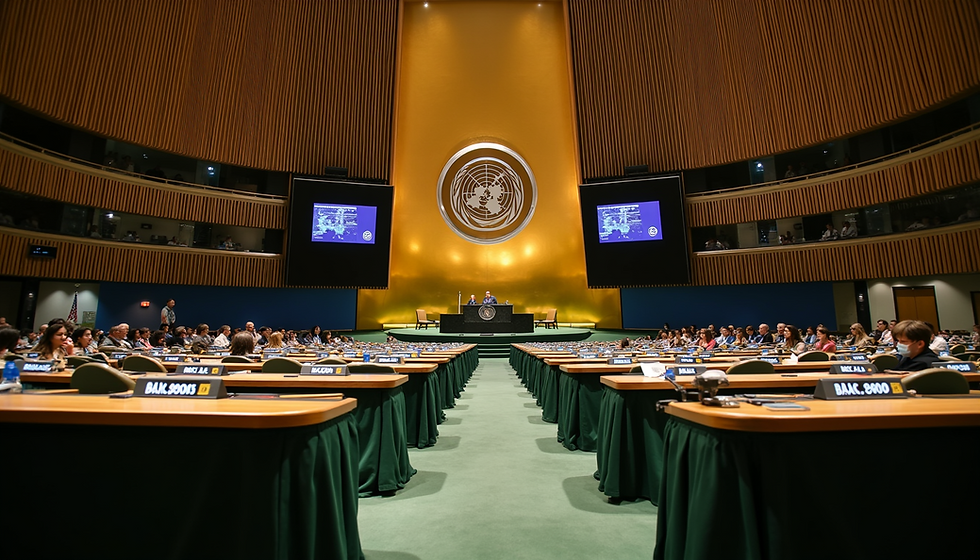Why Every Student Should Experience a Model UN Before College
- Vasu Patel
- Sep 16, 2025
- 3 min read

When we think about school life, the picture often revolves around exams, assignments, and extracurricular activities such as sports or cultural programs. However, one of the most impactful opportunities for students is participating in a Model United Nations (MUN). Beyond being an academic simulation of the United Nations, an MUN is a transformative experience that prepares young individuals not only for college but also for the larger world awaiting them. It develops skills that are increasingly recognized as critical in today’s interconnected and competitive environment.
One of the most immediate benefits of participating in MUNs is the development of confidence. Public speaking is often a daunting challenge for many students, but MUN provides a structured platform to practice and excel in this area. Standing before peers, articulating arguments, and responding to counterpoints instills a level of self-assurance that textbooks alone cannot provide. Students who once struggled to introduce themselves in class often find themselves confidently addressing committees of hundreds after a few MUN experiences. This skill becomes invaluable as they transition to higher education and professional environments where communication is key.
MUNs also cultivate a deep sense of global awareness. Each committee requires participants to research and represent a country’s position on pressing international issues such as climate change, human rights, cybersecurity, or peacekeeping. Through this process, students learn to appreciate perspectives beyond their immediate surroundings and develop a broader worldview. By the time they step into college, MUN alumni are already equipped with an understanding of how international events influence local realities, giving them an edge in academic discussions and global careers.
Leadership and teamwork form another cornerstone of the MUN experience. Delegates are required to negotiate, build consensus, and draft resolutions in collaboration with others. Leadership in this context is not about dominating discussions, but about enabling groups to work toward common goals. This collaborative approach mirrors real-world dynamics, where success often depends on influence, negotiation, and cooperation. These skills extend far beyond the committee room and prove essential in internships, group projects, and professional careers.
Another vital aspect of MUNs is the way they nurture critical thinking and problem-solving. Every committee simulates real-world crises or complex policy dilemmas, compelling students to think on their feet. They are challenged to analyze diverse perspectives, synthesize information quickly, and propose creative yet practical solutions. At a time when misinformation and polarization are global challenges, this training equips students with the analytical mindset needed to navigate complex issues with clarity and fairness.
From a career perspective, participation in MUNs significantly strengthens college applications and resumes. Universities and employers are not only looking for academic achievement but also for evidence of initiative, leadership, and intellectual curiosity. Highlighting MUN experiences in essays, interviews, or applications demonstrates these qualities effectively. In fact, many alumni of MUNs go on to pursue successful careers in law, public policy, business, diplomacy, and entrepreneurship, crediting their early exposure to debating global issues as a foundation for their professional growth.
Equally important, MUNs foster networks and friendships that often last a lifetime. Participants meet like-minded peers from different schools, cities, and sometimes even countries. These connections go on to become collaborations, mentorships, and valuable professional networks. The ability to build and maintain relationships is an underrated yet crucial skill, and MUNs provide an environment where this skill is naturally cultivated.
Ultimately, MUNs are far more than extracurricular activities; they are life-shaping experiences. When a student enters college after participating in MUNs, they bring with them not just academic preparation but also the confidence to speak publicly, the ability to collaborate effectively, the awareness of global challenges, and the mindset to lead and innovate. In a world where competition is fierce and opportunities are global, these qualities make all the difference.
In conclusion, every student should experience a Model UN before entering college. It is an opportunity to grow into a more confident, empathetic, and capable version of oneself. The lessons learned at MUNs extend well beyond the committee rooms and resolutions—they become part of how a student approaches learning, leadership, and life itself.




Comments